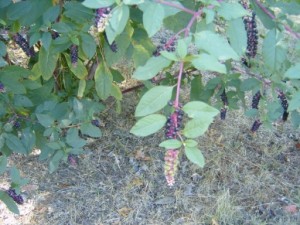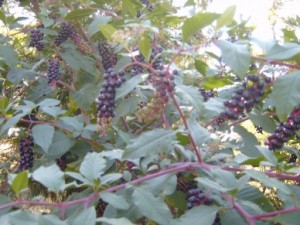Ask the Expert: What is it?
This plant is growing along my driveway and I have no idea what it is or if the berries are edible. It dies every winter and comes back every spring and gets larger every year. Thank you. Randy
Poke Weed In My Name But You Can Call Me Polk Salad
October 13, 2008 by 6 Comments


 Find Your
Find Your 




Randy,
The plant you have is called Poke Weed in the genius of Phytolacca. It is a perennial that goes by many names one of the most common being Poke Salad. Other names include poke, pokebush, pokeberry, pokeroot, polk sallet or ombú. Although some places in the southern U. S. eat this plant it is poisonous to humans and other mammals. However, birds do eat the berries and expel them whole which helps the plant to spread.
Thank you
I have been wondering about that for years.
In the South people collect the leaves and boil them; pouring off the water 3 times before using the leave for cooking. Chopped up and mixed with eggs the plant has a tast loosely related to spinach.
Tastey.
If you don’t pour the cooked water off 3 times, it may make your bowels a bit loose.
I was trying to pull up a poke week and it broke and part of the stalk went into my finger pretty far. In an hour or 2 my finger was swollen, red and hot. My question is whether the stalk is very poisonious in a situation like this. Just wondering how much I should worry about this.
I would say the swollen redness is a result of trauma when the stalk went into your finger. If you ingest the berries they can be toxic. However, other parts of the plant have been used for medicinal purposes. You may be having an allergic reaction. I would contact your doctor.
Don’t Eat Poke Salad
Auburn, June 18, 2002—Pokeweed is probably the best known and most widely used wild vegetable in America and Europe. However, a food scientist with the Alabama Cooperative Extension System says no part of this plant should be eaten by a person or animal.
“The roots, berries, seeds and mature stems and leaves of pokeweed are poisonous,” says Extension Food Scientist Jean Weese. There are at least three different types of poison in this plant — phytolaccatoxin, triterpene saponins, an alkaloid, phytolaccin, and histamines.
Pokeweed, a herbaceous perennial native to America, grows from Maine to Florida and Minnesota to Texas. Indians introduced the first colonists to pokeweed, and they took it back to Europe where it became a popular vegetable. It grows along roads and fencerows, in fields and in open woods.
Early American settlers also made a crimson dye from the berry juice. Indians often used the pokeweed concoctions for a variety of internal and external medicinal applications.
The berries, which ripen in fall, are also popular with migrating songbirds, especially robins, towhees, mockingbirds, mourning doves, catbirds and bluebirds. Sometimes the birds get drunk on overly ripe berries and fly into closed windows or sides of buildings.
For years, people have picked the young shoots and developing leaves (before they take on their reddish hue) off this plant and cooked them. The plant is still used by many people today, and the tender young shoots often appear in rural vegetable markets in the South.
Most people boil the shoots and leaves for 20-30 minutes, first in salt water and again in clean water, then eat the plant much like spinach.
“The boiling process removes some of the toxins but certainly not all of them,” says Weese. I suggest that people avoid this plant no matter how many times your mother or grandmother may have prepared it in the past and no matter how good it tasted. Why would you want to eat something that we know is toxic when there are so many other non-toxic plants out there we can eat?”
Source: Dr. Jean Weese, Food Scientist, Alabama Cooperative Exension System, (334) 844-3269